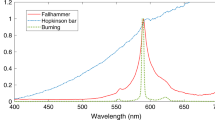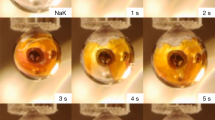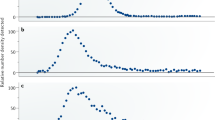Abstract
NITROUS oxide has been widely used as a specific scavenger for the solvated electron in the radiolysis of liquid water1–3; the rate constant for reaction (1) being greater than that for reaction (2) by a factor of 103 or more:  N2O concentrations > 1.2 × 10−2 M have invariably been found necessary to obtain values of G(N2) independent of [N2O] despite the large magnitude of k1. Values of G(N2) = 3.0 ± 0.1 obtained with this high concentration of N2O have been equated to
N2O concentrations > 1.2 × 10−2 M have invariably been found necessary to obtain values of G(N2) independent of [N2O] despite the large magnitude of k1. Values of G(N2) = 3.0 ± 0.1 obtained with this high concentration of N2O have been equated to  .
.
This is a preview of subscription content, access via your institution
Access options
Subscribe to this journal
Receive 51 print issues and online access
$199.00 per year
only $3.90 per issue
Buy this article
- Purchase on Springer Link
- Instant access to full article PDF
Prices may be subject to local taxes which are calculated during checkout
Similar content being viewed by others
References
Dainton, F. S., and Peterson, D. B., Proc. Roy. Soc., A, 267, 443 (1962).
Dainton, F. S., and Walker, D. C., Proc. Roy. Soc. (in the press).
Scholes, G., and Simic, M., J. Phys. Chem., 68, 1731 (1964).
Gordon, S., Hart, E. J., Matheson, M. S., Rabani, J., and Thomas, J. K., Disc. Faraday Soc., 36, 193 (1963).
Author information
Authors and Affiliations
Rights and permissions
About this article
Cite this article
HEAD, D., WALKER, D. Nitrous Oxide as a Scavenger in the Radiolysis of Water. Nature 207, 517–518 (1965). https://doi.org/10.1038/207517a0
Published:
Issue Date:
DOI: https://doi.org/10.1038/207517a0
Comments
By submitting a comment you agree to abide by our Terms and Community Guidelines. If you find something abusive or that does not comply with our terms or guidelines please flag it as inappropriate.



